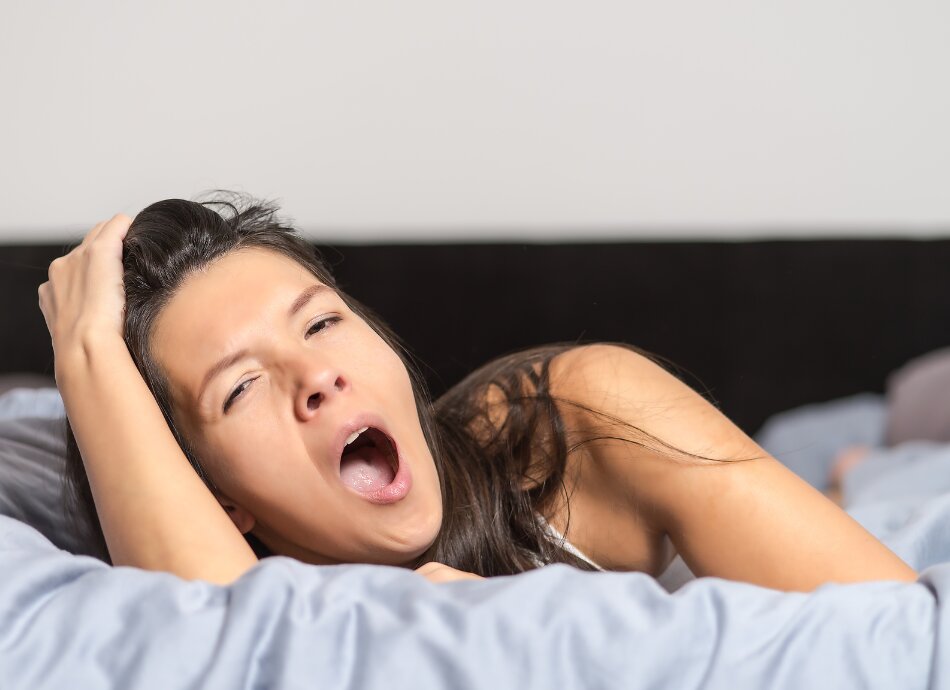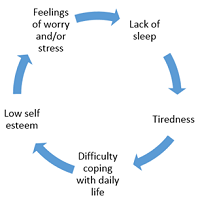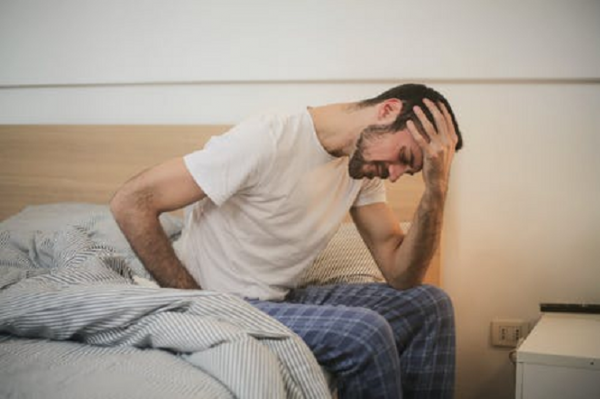If you're a frequent visitor to Healthify, why not share our site with a friend? Don't forget you can also browse Healthify without using your phone data.
How does sleep affect mental wellbeing?
Key points about sleep and mental health
- Your mental and emotional health is closely connected to how much sleep you get and the quality of that sleep.
- Not enough or poor quality sleep affects your psychological state and can contribute to developing a mental health condition.
- And if you have a mental health condition, it can be harder to get good quality sleep, which can contribute to developing a sleep condition, such as insomnia.
- It's important to learn how to improve your sleep.
- There are steps you can take on your own and there is also help available.

Brain imaging studies that show what is happening when you sleep suggest that a good night’s sleep helps build mental and emotional resilience. However, if you regularly experience poor sleep, this can create conditions for negative thinking and emotional vulnerability.
This is because getting enough sleep, especially rapid eye movement (REM) sleep, helps your brain process emotional information. It seems that a lack of sleep is especially harmful to processing positive emotional content. A lack of sleep also makes it harder to use the parts of your brain that help you manage emotions. This can influence your mood and emotional reactivity, which, in turn, are linked to mental health conditions and how severe they are.

Image credit: Mind, UK(external link)
There are several ways in which sleep can affect your mental wellbeing.
These include:
- finding it hard to fall asleep or stay asleep or waking up earlier than you'd like to (also known as insomnia)
- having problems that disturb your sleep, such as panic attacks, flashbacks, nightmares or psychosis
- finding it hard to wake up or get out of bed
- often feeling tired or sleepy – this could be because you're not sleeping enough, not getting good quality sleep or because of physical health conditions
- sleeping a lot – which could include sleeping at times when you want, or need, to be awake.
The things that affect sleep differ for everyone.
Common factors that disturb sleep include:
- stresses or worries, such as issues with money, housing or work
- problems with where you sleep, eg, if you sleep somewhere uncomfortable or where you're often disturbed
- sleep disorders such as insomnia, obstructive sleep apnoea, nightmare disorder, circadian rhythm disorders or restless legs syndrome
- being a parent or carer and having your sleep interrupted
- taking psychiatric medicine, including starting or coming off medicine, which can cause side effects including insomnia, disturbed sleep, nightmares and oversleeping
- using recreational drugs and alcohol
- working at night or being a shift worker
- current or past trauma
- hormonal changes that come with menstruation, pregnancy and menopause
- some mental and physical health conditions, including neurodegenerative conditions such as Alzheimer's disease and Parkinson's disease.
If you’re having problems sleeping, you might:
- be more likely to feel anxious, depressed or suicidal
- be more likely to have psychotic episodes – poor sleep can trigger mania, psychosis or paranoia, or make existing symptoms worse
- feel lonely or isolated, eg, if you don't have the energy to see people or they don't seem to understand
- struggle to concentrate or make plans and decisions
- feel irritable or not have energy to do things
- have problems with day to day life, eg, at work or with family/whānau and friends
- develop other health conditions, including mental health conditions.

Image credit: Canva
Poor sleep has been linked to depression, anxiety, bipolar disorder, post traumatic stress disorder (PTSD), attention deficit hyperactivity disorder (ADHD) and psychosis.
Depression
Insomnia and other sleep problems increase your risk of developing depression. And it works the other way around too: depression can also cause insomnia.
Up to 90% of people with depression have some kind of sleep problem. In most cases they have insomnia, but about 1 in 5 experience obstructive sleep apnoea. Depression and seasonal affective disorder (SAD) can make you sleep more, stay in bed for longer or sleep more often.
Insomnia and other sleep problems can limit how well treatment for depression works. They also increase the severity of depressive symptoms and make you more at risk of thinking about suicide.
This means it’s really important if you have depression and insomnia to view them as two separate problems and get help to improve your sleep.
Anxiety
Sleep problems affect up to 75% of people who experience generalised anxiety disorder. To a lesser extent, they also affect people with other anxiety disorders, including panic disorder, obsessive compulsive disorder and phobias.
Anxiety can cause racing or repetitive thoughts, and worries that keep you awake. You may also have panic attacks while you're trying to sleep.
Insomnia may also be a risk factor for developing an anxiety disorder, but not as much as it is for major depression. However, insomnia can make the symptoms of anxiety disorders worse or make it harder to recover.
For these reasons, if you have any kind of anxiety disorder and you are having problems with your sleep get help to improve it.
PTSD and trauma
Sleep disturbances affect up to 90% of people experiencing PTSD. If you've gone through trauma, this can cause flashbacks, nightmares or night terrors that disturb your sleep. You might feel unsafe or uncomfortable in bed or in the dark.
Bipolar disorder
Between 70–99% of people with bipolar disorder experience insomnia or sleep difficulties during a manic episode. Mania often causes feelings of energy and elation, so you might not feel tired or want to sleep. Racing thoughts can also keep you awake and cause insomnia.
In bipolar depression, however, many people sleep excessively (hypersomnia), while others may experience insomnia or restless sleep. A majority (70%) of people with bipolar disorder also report sleep disturbance between mood episodes.
Talk to your healthcare provider about your sleep and get help to learn how to manage it well.
ADHD
Sleep disturbances are common across all ages of people who experience ADHD. Both adolescents and adults with ADHD have more sleep disturbance than people without ADHD. Studies have found up to 65% of adults with ADHD experience insomnia.
Various sleep problems affect up to half of children with ADHD. Typical problems include difficulty falling asleep, sleeping for a shorter time and restless sleep.
The symptoms of ADHD and sleeping difficulties overlap so it can be difficult to tease them apart. About 1 in 4 children with ADHD have sleep-disordered breathing and about 1 in 3 have restless legs syndrome. Children with these sleep disorders may become hyperactive, inattentive and emotionally unstable, even when they do not meet the diagnostic criteria for ADHD.
Psychosis
Paranoia and psychosis may make it difficult to sleep. You may hear voices, or see things you find frightening or disturbing.
Talk to your healthcare provider if this is happening for you.
If your sleep is disturbed, sleep hygiene techniques such as those listed below will help improve your sleep. However, if these don't work for you, you may have developed a sleep disorder, such as insomnia. If you have a mental health condition, you need to treat the insomnia as a separate condition.
Talk to a counsellor or therapist, preferably one who specialises in sleep disorders. They can help you address any underlying issues contributing to your mental health condition, such as trauma. They will also use cognitive behaviour therapy for insomnia (CBTi) to help you improve your sleep.
There are several things you can do to help your body naturally go to sleep and for your sleep to be of good quality so you wake feeling refreshed. Good sleep starts long before you go to bed. What you do during the day, as well as how you spend your evenings, can have a significant effect on whether you get a good night's sleep. Read these sleep tips to improve your sleep to help your mental health.
Apps reviewed by Healthify
You may find it useful to look at some Mental health and wellbeing apps and Sleep apps.
Mental health and sleep(external link) Sleep Foundation
How to cope with sleep problems(external link) Mind, UK
Apps
Mental health and wellbeing apps
Sleep apps
References
- Yoo S-S, Gujar N, Hu P, et al. The human emotional brain without sleep — a prefrontal amygdala disconnect(external link) Current Biology. 2007 23 Oct; 17(20):R877-R878.
- Manber R, Chambers AS. Insomnia and depression: A multifaceted interplay(external link) Current Psychiatry Reports. 2009; 11:437–442.
- McCall WV, Reboussin BA, Cohen W. Subjective measurement of insomnia and quality of life in depressed inpatients(external link) J Sleep Res 2000, 9:43–48.
- Dombrovski AY, Cyranowski JM, Mulsant BH, et al. Which symptoms predict recurrence of depression in women treated with maintenance interpersonal psychotherapy?(external link) Depress Anxiety 2008, 25:1060–1066.
- Papadimitriou GN, Linkowski P. Sleep disturbance in anxiety disorders(external link) Int Rev Psychiatry. 2005;17:229–36.
- Richards A, Kanady JC, Neylan TC. Sleep disturbance in PTSD and other anxiety-related disorders: an updated review of clinical features, physiological characteristics, and psychological and neurobiological mechanisms(external link) Neuropsychopharmacol. 2020; 45:55–73.
- Morton E, Murray G. An update on sleep in bipolar disorders: presentation, comorbidities, temporal relationships and treatment(external link) Current Opinion in Psychology. 2020 Aug; 34:1-6.
- Becker SP. ADHD and sleep: recent advances and future directions(external link) Current Opinion in Psychology. 2020 Aug; 34:50-56.
Credits: Healthify Editorial Team. Healthify is brought to you by Health Navigator Charitable Trust.
Reviewed by: Dan Ford, Behavioural Sleep Psychologist, Auckland
Last reviewed:
Page last updated:





